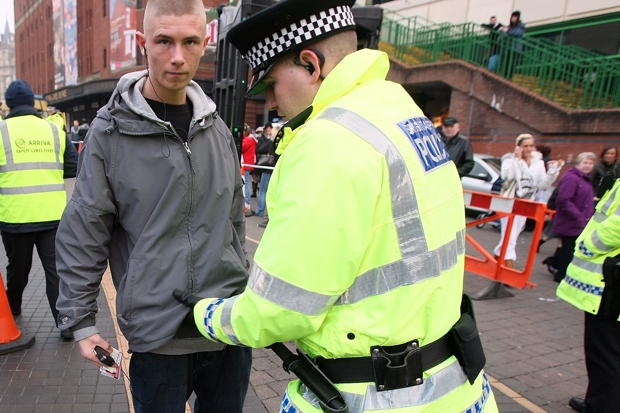So Theresa May has won her battle with Number 10 on stop-and-search reform, sort of. She announced a number of changes this afternoon to the power for police – but they’re all voluntary. That the Home Secretary has managed to get any of these changes into a state where she can announce them is a victory – but the initial voluntary nature of the reforms was the compromise necessary to make this announcement happen. The changes are as follows:
- The Police and Criminal Evidence Act Code of Practice A will clarify what constitutes the ‘reasonably grounds for suspicion’ on which the police carry out the vast majority of stop-and-searches. If officers do not use their powers properly, they will be disciplined.
- May has written to all chief constables and police and crime commissioners to tell them they must adhere to the Code of Practice. If they do not, the government will legislate to make this a statutory requirement.
- Alex Marshall, chief executive of the College of Policing, will review the national training of stop-and-search. Marshall will develop ‘robust professional standards’ and the College will also carry out unconscious bias awareness training.
- The Home Office and the College of Policing will launch a scheme on the best use of stop-and-search, which will record how well forces are interpreting the ‘reasonable grounds for suspicion’. This already has the backing of the Metropolitan Police.
May was congratulated by colleagues across the House for the changes – with just a few such as David TC Davies expressing concern from the backbenches about what they feared might be a watering down of an important tool for the police. Davies was probably echoing the concerns aired privately by the Prime Minister, who does believe that stop-and-search is an important power. And although Patrick Rock, who was another key opponent, leaving Downing Street may have changed the climate in Number 10 on this, it would have been the Prime Minister’s concerns about the reforms that would have held things up as much as anything else. Now he appears to have agreed to them – albeit in an initially voluntary form with the backstop threat of legislative action from the government. That the threat of legislation is there at all is still significant.
But while Labour backbenchers were happy to acknowledge that this really was progress on an issue that upsets many of their constituents from ethnic minority communities in particular, Yvette Cooper’s response seemed strangely graceless. Labour only became animated by stop-and-search reform when reports started to emerge that Number 10 was holding it up, but Cooper was extremely disapproving, and dismissed the reforms as not going far enough. She seemed to have rather riled Diane Abbott with her tone, who later told the Commons:
‘The Home Secretary will be aware that concern about stop and search in urban communities goes all the way back to the 1980s, and the original Brixton riots. Given that successive governments failed to act, she gets some credit from some of us for having taken things as far as she has done, but there is no single issue that poisons relationships between urban communities and the police more than stop-and-search and we have all heard her say that unless the ratio between stops and arrests get better there will need to be legislation, she must be aware she will be held to that.’
May replied:
‘I have absolutely no doubt that the right honourable lady and others in this house will do just that.’
The point is that this is a victory for those who felt that stop-and-search was leaving some communities in despair. Charles Walker told the House of his horror at hearing from one man who had been stopped and searched 50 times in 5 years, and mused that if this had happened to his own children, he would despair too. What wasn’t discussed, but which is also a key element in May’s fight, is that this is an important step for the Conservatives in working on their relations with ethnic minority voters who have previously worried that the party does not speak for them or listen to their concerns.







Comments